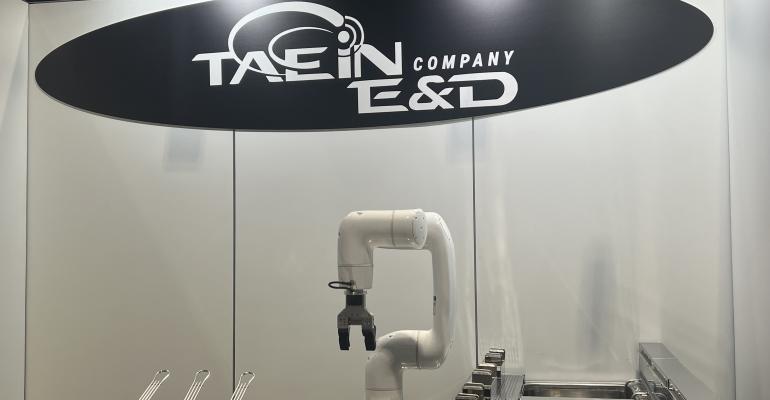While the National Restaurant Association Show is no stranger to eco-friendly products and solutions — from compostable packaging to energy efficiency solutions — modern technology is starting to play a larger role in foodservice sustainability.
This year at the National Restaurant Association Show, there are several new and up-and-coming products and companies showcasing AI, blockchain, and IoT-driven sustainable solutions for the restaurant industry. Here are four highlights:
Eco-Friendly fryers
Taein E&D, a foodservice technology and equipment company based in South Korea, was showcasing at the Restaurant Show for the first time this year, and was showing off some of the company’s new sustainable equipment at the Startup Alley section of the Show.
One of the pieces of equipment the company sells is the ultrasonic deep fryer, which uses ultrasonic waves (an inaudible sound/vibration) to deep fry food—an option that both uses less power (5 kilowatts) and less oil than a traditional fryer. According to Jinhee Han, a representative with the company on the show floor, the technology can reduce frying time by up to 35%, and can reduce oil vapors as well.
Together with a robotic arm that can automatically fry the food in the ultrasonic fryer, the entire system costs $50,000, and the Taein E&D is looking to sell the product to operators in the U.S. for the first time this year.
Carbon footprint tracing
Foodservice manufacturing company Supreme Source & Supply is showcasing Nature’s Source, a packaging company and sustainability advocate for the first time at the National Restaurant Association Show. The company goes one step further than the dozens of eco-friendly packaging and dinnerware solutions at The Show by offering new carbon footprint tracing technology.
The technology allows operator customers to monitor their packaging carbon footprint in real time, and allow them to make swaps (using Nature’s Source products or others) to packaging that will be less harsh on the environment. Through vertical integration in their supply chain, the company uses data to trace packaging manufacturing back to the raw material, then they gather data based on how the packaging product is made, and finally how it is transported.
“We take all of that data, formulize it into our algorithm and from there we get our carbon footprint,” Camilo Ferro, a representative with Nature’s Source, said.
The data is then all independently verified and certified by an external global accreditation company.
“All of our customers can then all see how their packaging is being more carbon efficient, or if they want to reduce carbon, they can tell us they want to reduce 60% of their packaging carbon footprint, they plug their numbers into their platform and they can recommend what they would need to do [to reach their sustainability goals],” Ferro said.
AI-driven food waste prevention
MetaFoodX is an AI-driven sustainability technology company that allows operators to track their real-time food consumption and waste. The company’s main product is an AI scanner, which lets operators scan menu items, and check for food safety compliance and predict ingredient needs based on machine learning from historical data, guest count and weather for forecast efficiency.
“The idea is to give them a tool so they can control and ultimately eliminate food waste and increase operational efficiency,” Fengmin Gong, CEO of MetaFoodX said. “We are the first tool providing the device to automatically track food consumption…It’s IoT plus AI, plus automation.”
Workers can put an item on the scanner, and the scanner will recognize the food item and know the weight, and it can be tracked when it goes into the service line, and then if it’s pulled off the service line if food is leftover.
Currently, MetaFoodX is primarily working with non-commercial facilities like universities and hospitals, but Gong said they would be open to working with restaurant operators in the future.
Internet of Things merges food safety with sustainability
SmartSense by Digi is another technology provider that offers solutions to reduce food waste and energy consumption through IoT (Internet of Things), which turns ordinary inanimate objects into smart objects by connecting them through a network. The company’s products can monitor temperature of food (to determine if meat has spoiled, for example) or even ripeness of produce based on the presence of gases within the fruits and vegetables.
The technology is meant to reduce food waste by letting employees know with better precision exactly how long a meal has been sitting out, if it’s still safe to serve, or if it should be thrown away.
“The guy who makes the pizza knows that when the pizza comes out, you take the probe, put it in the pizza, and then if it’s green then it’s all good to serve.” Guy Yehiav, president of SmartSense by Digi, said. “Two hours later it will tell you, ‘Buffalo chicken pizza batch one needs to be thrown away because it’s been two hours.’”
Contact Joanna at [email protected]m




